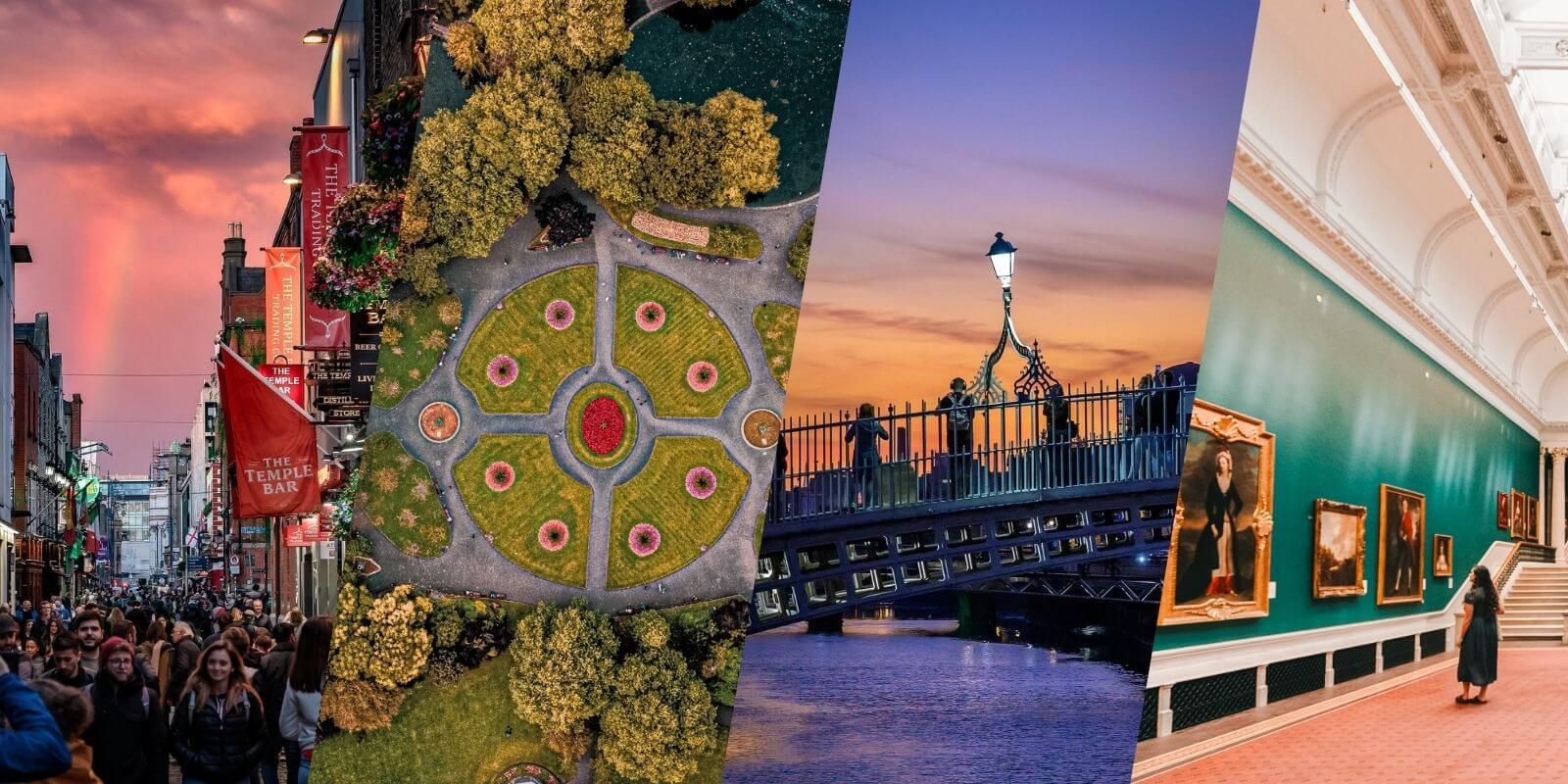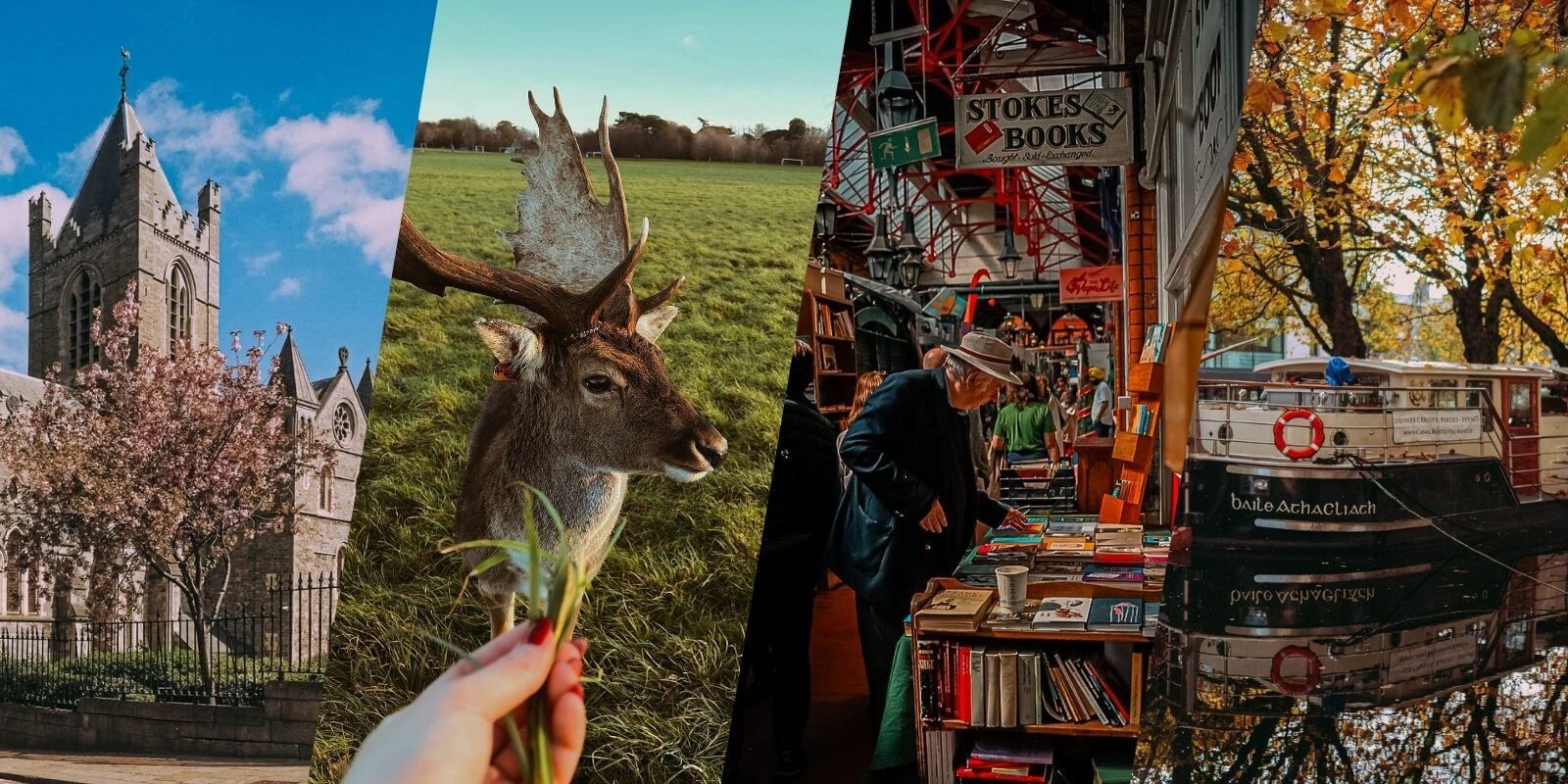Studying abroad in Ireland offers unforgettable experiences. Learn about student exchange programmes and how to make the most of your time. Thinking about going on a student exchange? Look no further than Ireland, often called the Emerald Isle! With its rich history, lively culture and stunning scenery, Ireland is the perfect place to boost your education while having an unforgettable experience. This guide is packed with everything you need to know about studying abroad in Ireland, full of useful advice and insider tips.
From the bustling streets of Dublin to the jaw-dropping Cliffs of Moher and the magical landscapes of the Ring of Kerry, Ireland offers students a wealth of experiences. Get to know the locals, enjoy traditional Irish dishes and discover castles and ancient ruins dotted around the countryside.
Ireland is known for its top-tier education, with world-class universities, passionate professors and a vibrant student community. Whether you're into the arts, technology or business, Ireland has something for every student. So, grab your passport and let's dive into an adventure full of myths, legends and the famous Irish charm!
Why Choose Ireland for a Student Exchange Program?
Ireland is a hot spot for international students looking for a one-of-a-kind education. But what makes Ireland so special for exchange students?
First off, the quality of education in Ireland is top-notch. Universities like Trinity College and University College Cork consistently rank among the best in the world. You'll find a variety of programs, from arts to sciences, taught by experts in their fields.
But it’s not just about academics. The Irish are famous for their warmth and hospitality. People are genuinely interested in getting to know you, making it super easy to integrate into the local community. Ireland’s rich multicultural scene also gives students a chance to grow personally by interacting with people from all walks of life.
Top Universities and Language Schools in Ireland for International Students
Ireland has some of the best universities globally and they attract students from every corner of the world. With over 40 schools in Dublin, choosing one can be overwhelming. Prioritize schools on the ILEP list, which are government-approved. Research locations, class methods and talk to other students to ensure the school fits your needs.
Here are a few Universities and Language Schools:
Trinity College Dublin: Founded in 1592, it's the oldest and most prestigious university in Ireland. Known for the gorgeous Trinity College Library and its famous Book of Kells, it offers everything from humanities to cutting-edge science and engineering programs.
University College Dublin (UCD): A favourite for those interested in business, law and the sciences, UCD is one of Europe’s leading universities. The vibrant student life, modern facilities and strong international community make it a fantastic choice for students.
University College Cork (UCC): Situated on a scenic riverside campus, UCC is known for its excellence in fields like medicine, engineering and the arts. With a focus on research and student support, it's an excellent environment for international students.
Academic Bridge English School: Ideal for students needing a strong foundation in English and academic skills, Academic Bridge offers tailored programs to help you succeed in higher education.
NED College: Focused on practical English courses for business and vocational training, NED College is great for those aiming to enhance their language skills for career advancement.
SEDA College: Known for flexible language courses and professional training, SEDA College provides a supportive environment to boost your English proficiency and gain valuable qualifications.
How to Apply for a Student Exchange in Ireland
Applying to study in Ireland is straightforward, but there are a few steps to follow. First, do your homework on which program or university you’re interested in, as each one has different application processes.
Most universities offer plenty of help to international students, guiding you through filling out forms, submitting transcripts, writing a personal statement and possibly proving your English skills with exams like the IELTS or TOEFL. Some programs might also ask for extra stuff like recommendation letters or portfolios, so be sure to check the specific requirements.
For English Courses, to get your Irish student visa, you'll need to be enrolled in a 25-week course. Upon arrival, immigration will issue a temporary visa, but you need to book your permanent Stamp 2 visa appointment ASAP. Check the Burgh Quay website daily for slots!
Once you’ve sent everything in, the university will review your application. If you're accepted, you’ll need to apply for a student visa. This process is handled by the Irish embassy in your home country and you might need to show proof of financial support and a valid passport.
Living and Studying in Ireland: Housing, Transport and Costs
Housing in Dublin can be tight. Book temporary accommodation (like hostels) for your first month to give yourself time to find a permanent place. Popular options include shared houses, staying with a host family or renting a studio.
When it comes to day-to-day life in Ireland, you’ve got a lot of options. For housing, many universities offer dorms or student apartments, which are affordable and often come with helpful perks like lounges and laundry facilities. You could also rent an apartment or shared housing if you prefer a bit more independence.
Ireland’s public transport system is pretty reliable, with buses, trains and a light rail in Dublin. Students usually get discounts on fares and if you like a bit more freedom, renting a car is also an option.
Cost of living depends on where you are and your lifestyle, but Ireland is generally cheaper than some other European countries. Universities also offer scholarships and financial aid to help ease the burden of tuition and living expenses.
Once you have your Stamp 2 visa, you can work up to 20 hours a week (honestly, most of the students work more than that). Prepare a strong CV or Portfolio and start applying online (LinkedIn, Indeed, Glassdoor, Jobs.ie and others) or visit local businesses to drop off your CV.
Get Your PPS Number and Open an Irish Bank Account
To work in Ireland, you’ll need a Personal Public Service (PPS) number. Apply online at MyWelfare with a letter from your employer and proof of address. After securing a job, you'll need a bank account. Schedule an appointment with banks like AIB or Bank of Ireland. You also can use some digital banks such as Revolut or MoneyJar. Be sure to bring your ID, PPS number and proof of address.
Exploring Irish Culture and Traditions
One of the best parts of studying in Ireland is experiencing its rich cultural heritage firsthand. From ancient Celtic myths to modern music and dance, there's so much to soak in.
Check out famous spots like the Cliffs of Moher, the Rock of Cashel and the Giant’s Causeway for a taste of Ireland’s deep history and natural beauty. Dive into the buzzing atmosphere of traditional Irish pubs, where you can enjoy live music, friendly conversations and good times.
For art lovers, Ireland has a vibrant scene with galleries, theatres and music festivals. Events like the Galway International Arts Festival (July) and the Dublin Theatre Festival (Sept-Oct) are fantastic for students wanting to tap into Ireland’s creative pulse.
Must-Visit Tourist Attractions in Ireland
Ireland’s natural beauty and historical landmarks make it a dream destination for students. Whether you’re exploring the capital or venturing into the countryside, there’s always something to see.
In Dublin, be sure to visit Trinity College and the Guinness Storehouse. For natural wonders, the Wicklow Mountains and the Ring of Kerry are absolute must-sees. If history excites you, don’t miss the Rock of Cashel or kiss the Blarney Stone at Blarney Castle – it’s said to give you the "gift of the gab."
Staying Safe and Healthy in Ireland
Ireland is a safe and welcoming country and universities go the extra mile to ensure international students feel secure. Most universities have 24/7 security, emergency contacts and support services to help you if anything goes wrong.
Healthcare in Ireland is also accessible in case you have Health Insurance. The Health Service Executive (HSE) offers a wide range of services and many universities have health clinics on campus. And as an international student, you’ll need health insurance, which can be organized through your school or independently.
Tips for a Successful Student Exchange in Ireland
1. Learn about Irish culture: Understanding local customs will help you settle in faster and connect with people.
2. Brush up on some Irish phrases: Though English is widely spoken, a little effort to learn basic Gaelic can impress the locals!
3. Explore the outdoors: Ireland’s natural beauty is one of its biggest attractions, so don’t miss out on exploring its stunning landscapes. (Don't forget to check the weather before!)
4. Get involved: Join campus clubs and activities to make friends and fully embrace the student life.
5. Budget smartly: Create a financial plan that covers everything from tuition to leisure activities.
6. Stay connected: Keep in touch with family and friends back home, but also make an effort to form bonds in Ireland.
7. Be flexible: Embrace the unexpected and dive into new experiences with an open mind!
Making Memories in the Emerald Isle
Studying in Ireland will be a life-changing experience, full of challenges, growth and unforgettable moments. Whether it’s the lively cities or the peaceful countryside, Ireland has a way of getting under your skin and leaving a lasting impression.
As you get ready for this adventure, be curious, stay open to new experiences and remember to enjoy every moment. Ireland is waiting to welcome you with open arms and countless memories to create.
Need a cosy spot to rest in Dublin or the surrounding countryside? Check out our discounted rates available when you book today!
📖 Discover much more here! 📖




